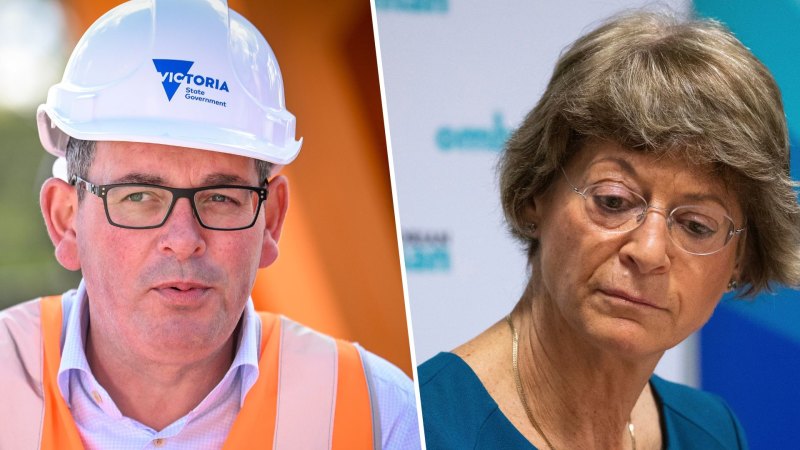Save articles for later
Add articles to your saved list and come back to them any time.
The Victorian ombudsman has slammed Premier Daniel Andrews, calling a recent report into his government’s conduct “damning” and saying the state had fallen behind in parliamentary integrity.
In radio interviews on Wednesday morning, Deborah Glass said she was disappointed the premier downplayed the Independent Broad-based Anti-corruption Commission (IBAC) report, which found the Andrews government improperly awarded a Labor-affiliated union a $1.2 million contract.
Victorian Ombudsman Deborah Glass is approaching the end of her 10 years in the role.Credit: Paul Jeffers
Speaking to 3AW’s Neil Mitchell, Glass revealed that IBAC’s Operation Daintree initially began as a Victorian Ombudsman investigation.
“We worked on it for a good six months. What became clear to us is that there was a suspicion of corrupt conduct on the part of, in this case, the premier and two former ministers for health,” she said, adding that’s why she handded over the case to IBAC.
She stressed that suspicion of corrupt conduct did not constitute an official Victorian Ombudsman finding.
Operation Daintree found that staff working for two former health ministers and inside the Premier’s Private Office (PPO) breached their ethical obligations by pressuring independent bureaucrats to award a contract to the Health Workers Union.
That contract was to train hospital staff to deal with violence against health workers on the eve of the 2018 election. In the case of the PPO staffer, the pressure was exerted through the then health minister’s office.
After the Operation Daintree report was tabled in state parliament, Andrews sought to downplay the document, stressing there were no findings against named individuals and telling reporters it was “educational”.
Asked about this stance during the 3AW interview, Glass said: “I think it says a lot about the premier’s views on corruption and integrity.”
She added IBAC’s latest report was not an educational report.
“It was a damning report about misconduct of ministerial advisers and ministerial responsibility for those advisers.”
The word “educational” appears once in IBAC’s 132-page report. The document defends its findings by saying they fulfil the watchdog’s requirement to educate the public service about integrity issues, as stipulated by the legislation that governs it.
Glass told 3AW that Victoria was now a laggard, rather than a leader, in parliamentary integrity.
“I think people are rightly concerned about that. We have fallen behind in not having … transparent, accountable, enforceable standards for people in public life when it falls short of that high threshold for criminal contract.”
Some legal experts, such as former Court of Appeal judge Stephen Charles, KC, have called for the Victorian government to broaden the definition of corruption to include grey corruption. Grey corruption is defined as questionable behaviour or decision-making that benefits a person’s associates or networks without necessarily amounting to criminal conduct.
Later on Tuesday, Glass spoke about the Operation Daintree report on ABC Radio Melbourne.
“There were no findings of corruption. That has everything to do with a very high threshold for corruption findings that we have here in Victoria,” she said.
Glass said the problem was not so much about the threshold or definition of corruption, but what happened when behaviour fell short of that “very high criminal threshold … is unethical, is wrong, and there are no consequences”.
The government has said it will consider all of IBAC’s 17 recommendations contained in the Operation Daintree report and respond via a cabinet process chaired by the premier.
Glass was appointed to her 10-year term in March 2014. Her replacement is expected to be announced early next year.
The Morning Edition newsletter is our guide to the day’s most important and interesting stories, analysis and insights. Sign up here.
Most Viewed in Politics
From our partners
Source: Read Full Article

